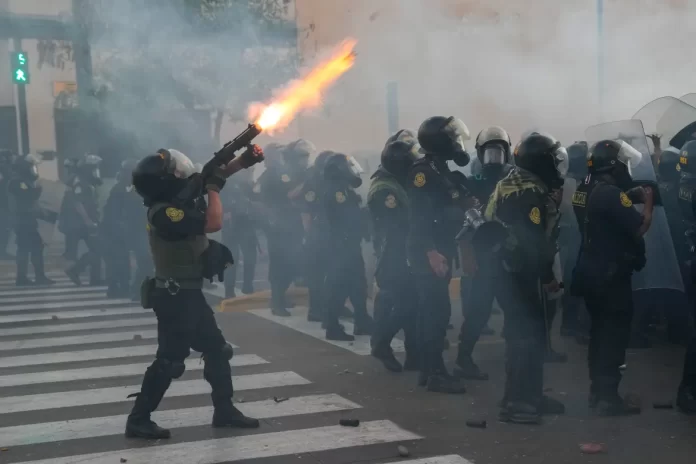Thousand of Peruvians have once again taken to the streets in the capital, Lima, to demand the resignation of President Dina Boluarte, hours after she called for a “truce” following almost two months of violent protests.
Clashes erupted in the city center on Tuesday as anti-government protesters threw stones and police fired multiple volleys of tear gas to disperse them.
The protesters shouted “murderers” as police blocked the passage of the demonstrators.
Television footage showed some people and police officers were injured, although not seriously. Several hours later, calm was restored.
Even after most of the protesters left, police continued firing tear gas to disperse small groups of people in a plaza in front of the country’s Supreme Court.
“We can’t have a truce when she doesn’t tell the truth,” a protester said of Peru’s president, AP reported.
Another protester said, “I have a right to protest in this country,” as he was being treated by volunteer paramedics.
Boluarte had earlier blamed protesters for the political violence that has engulfed the country, claiming in a news conference that illegal miners, drug traffickers, and smugglers formed a “paramilitary force” to seek chaos for political gain.
Read more: Titi has been married to the former Vice President for 50 years
Protests have been widespread since former Peruvian President Pedro Castillo was ousted in December last year in what his supporters characterized as an orchestrated coup.
Since then, at least 46 people have died in violent clashes between the security forces and Castillo’s supporters, who have been setting up burning roadblocks, attempting to storm airports, and staging mass rallies across the country.
Demonstrators demand the resignation of Boluarte, snap elections, a congress reshuffle, and a new constitution. Moreover, they demand better living conditions, which they say they have been deprived of in the last two decades.
Boluarte has only agreed with bringing the elections forward.
The unrest has prompted the government to extend a state of emergency to six regions, curtailing some civil rights.













